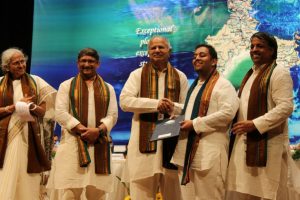
When Venkatesh Potluri talks about having a vision for more inclusivity and accessibility in all spheres of life, the irony couldn’t be more stark. Born with a vision impairment, Venkatesh credits his loving family to making sure he never missed out on anything in life. Whether it was a mainstream school education or experiences in music and sport, one can truly say he’s “been there, done that”.
Mutual Respect and Admiration
Obviously, it hasn’t been a smooth-sail. Venkatesh says that despite his academic brilliance and laurels, he wasn’t even allowed to appear for the AIEEE – the national-level competitive test for admission into various engineering and architecture institutes. His family was short of approaching the National Human Rights Commission when IIIT-Hyderabad opened its doors and welcomed him. Prof. P.J. Narayanan, the Director of IIIT-H says, “Venkatesh and his parents came to the institute to explore if we had anything in store for someone like him. It was clear he came with infinite passion and unusual talent. The institute took the matter to its Governing Council which was happy to explore a way to take him into a 5-year MS by Research program directly.” It comes as no surprise that IIIT-H holds a special place in Venkatesh’s heart. “At a time when engineering institutes were denying me an opportunity to study solely due to my disability, IIIT-H chose not to take that route. Instead, they evaluated my suitability and competency for the program and offered me an admission solely based on merit in 2010.”

Limitations of existing Accessibility Tools
He has had the honour of addressing a TEDx Youth forum at Hyderabad where he talked about his journey so far. Like most other students opting for a degree in CS, Venkatesh traces his fascination towards computers when he was gifted one at 8. He mentions how he operated computers with the help of screen readers. A screen reader is a kind of software that converts text-to-speech and basically reads aloud all the text on screen including the navigation buttons. But notwithstanding the obvious advantages, the screen reader comes with its fair share of drawbacks. In fact, it is worth the while to carry out an experiment to really know what it’s like to operate a computer without the benefit of vision. Blindfold yourself and listen to the screen reader. It is a robotic voice that reads out things at seemingly super-sonic speed, sounding much like gibberish. If this sounds tough, imagine learning Math and computer programming in this manner.
Integrated MS by Research Programme
“One of the significant challenges people with visual impairment face is accessing mathematical content.Though the current scenario for math accessibility has improved, technology is still woefully inadequate to enable a visually impaired person to access STEM content independently”, he rues. No surprise then, that Venkatesh, under the guidance of Dr. Kishore S Prahallad and Dr. Priyanka Srivastava, presented his thesis on “Audio Rendering of Mathematical Content”. He could do this as an integrated MS by Research student at IIIT-H where graduated from in 2015. According to Venkatesh, “This style of a degree programme has helped me strengthen the fundamental knowledge on Computer Science and has also given me the flexibility to decide on a research problem that interests me and explore further. This is where I had my first brush with research and my pursuit on accessibility research started.” He credits his professors with being patient and approachable as well as his peers who went the extra mile to support him in his IIIT-H journey. The Director, Prof. P.J. Narayanan affirms, ”Other students helped him out in many ways which was very satisfying to the institute”. Venkatesh is himself all praise for his alma mater when he remarks that to the best of his knowledge, he may have been the first visually impaired person on campus, but “I have a feeling that I am not the last, as this institute gives a chance to anyone with the right skills and zeal for knowledge to excel in life”.
Microsoft Research Fellow
Venkatesh is currently a research fellow at Microsoft Research Lab India, Bangalore. He is working on developer productivity and making IDEs (Integrated Development Environments) more accessible to the visually impaired. The IDEs are powerful tools and come with a whole host of features that are considered to make things simpler for developers. Venkatesh would beg to disagree. The information that is disseminated from these systems is still conveyed visually – in colour, squiggles, charts and graphs and other graphical models. And this information is not available to screen reader users. That’s how project CodeTalk came about. The biggest validation for Venkatesh and his team was that their features were not only well received by just the visually impaired but by the sighted developers as well. Similar is his SoundScape project for Visual Studio. It is an audio UI that converts the multiple windows existing in Visual Studio into a “spatial audio cloud consisting of spoken text and non-speech audio surrounding the developer”. Again, opening up hitherto inaccessible capabilities to the visually impaired. The Director of IIIT-H says, “Venkatesh has made us all extremely proud through his achievements at the institute and after leaving it.”
Multi-Faceted
Venkatesh describes himself as an aspiring researcher and drummer on his webpage. Always inclined towards music, he says, “Playing the drums came naturally to me”. He was part of some rock bands whilst still at school and later at IIIT-H too, participating in and representing the institute at various inter-collegiate festivals. Research has always been at the top of Venkatesh’s mind. He has applied to various top graduate schools in the US for doing his PhD where, to quote the Director, “He…(will be) making tremendous contribution to accessibility research for everyone”.

Role-Model
You can’t be what you can’t see. Venkatesh Potluri echoes these words of Marie Wilson (from The White House Project) when he signs off with, “I have been faced with challenges due to misconceptions in society about blindness and visual impairments. But I believe that the best way to prove that these are misconceptions are by showing examples. I feel that no visually impaired student should face the technological and societal challenges to pursue careers in STEM. I am doing my best towards achieving this goal but at the very minimum, I want visually impaired students to have an example to talk about the next time somebody tells them they cannot do Engineering because they are blind.”



Congratulations Venkatesh, we are very proud of you, have a wonderful future.BABA BLESS YOU
Bhanu Prakash says:Way to go Venkatesh. You are a source of inspiration. Keep going and the Universe will always be with you.
Raajesh Senha says: